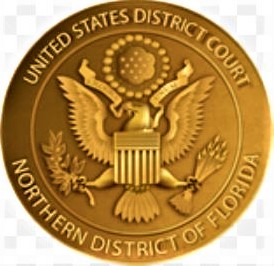
Gustavo Adolfo Pareja, 26, of Cali, Colombia, was extradited by the United States Attorney’s Office for the Northern District of Florida last week as a result of an extensive investigation by the Drug Enforcement Administration. Pareja is charged with two federal drug trafficking conspiracy charges involving large amounts of cocaine that are alleged to
have been imported into northern Florida. He made his initial appearance Monday at the U.S. Courthouse in Pensacola.
The extradition and charges were announced by Lawrence Keefe, United States Attorney for the Northern District of Florida.
“This extradition clearly demonstrates that North Florida law enforcers stand united against drug trafficking,” said U.S. Attorney Keefe. “We have strong partnerships with our local, state and federal partners, and together we will continue to aggressively investigate and prosecute those that prey on our communities. If you are trafficking drugs in our District, you will be held accountable.”
It has been alleged that between January and August 2018, in the Northern District of Florida and in the country of Colombia, former Master Sergeant Daniel Gould of the United States Army and Henry Royer, formerly of the United States Army and Army National Guard, conspired to distribute large amounts of cocaine, knowing it would be unlawfully imported into the United States.
Pareja is alleged to be the source of supply of the cocaine in Bogota, Colombia. He has been awaiting international extradition proceedings for over a year. Last week, the United States Marshals Service flew from northern Florida to Bogota, wherein the Colombian authorities relinquished Pareja to American law enforcement in order for him to stand trial in Pensacola, Florida.
The conspiracy is alleged to have begun in early 2018 when Gould and Royer initially imported 10 kilograms of cocaine into the United States. Royer traveled to Colombia with U.S. currency to use as payment. Gould placed the cocaine in a gutted punching bag and had the package transported to Bogota to be placed on a United States military aircraft. A few days later, the cocaine-filled punching bag arrived at Duke Field, which is an auxiliary airfield of Eglin Air Force Base. Gould and Royer distributed the 10 kilograms of cocaine in Northwest Florida. Gould and Royer then reinvested the money from the first load of cocaine into a second load of 40 kilograms of cocaine. Gould placed approximately $65,000 in cash on a United States military cargo aircraft destined for Colombia as funds for the next purchase.
In early August 2018, Gould and Royer returned to Colombia and provided money for the 40 kilograms to Pareja, their alleged cocaine supplier. Gould and Royer received the cocaine, loaded the 40 kilograms into two gutted punching bags, and coordinated transport to the embassy before flying back to the United States. Suspicion was aroused at the embassy when packages were x-rayed, revealing cocaine within gutted out punching bags.
On August 13, 2018, when the cocaine was seized at the embassy, Gould had already returned home and was awaiting its arrival. The 40 kilograms of cocaine would have an estimated value in excess of $1 million in the Northern District of Florida. Gould and Royer have pled guilty to their involvement in the criminal activity and are serving sentences in federal prison.
“An apparent source of supply for cocaine into Pensacola has been knocked out,” said DEA Miami Field Division’s Acting Special Agent in Charge Keith Weis. “Pareja is alleged to have participated in a highly brazen criminal scheme to open a pipeline into Northern Florida for illicit distribution that was shut down. Now, like others he conspired with, he will face serious federal narcotics trafficking charges as a result of his actions.”
If convicted, Pareja faces a mandatory minimum sentence of 10 years up to life in federal prison. A trial date will be set before Senior United States District Judge Roger Vinson in Pensacola. This case resulted from an investigation by the Drug Enforcement Administration and the Gulf Coast High Intensity Drug Trafficking Area (HIDTA) program. Assistant United StatesAttorney David L. Goldberg is prosecuting the case.





















































